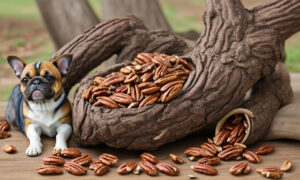When it comes to canine nutrition, pet owners are often inundated with mixed messages about what they can and cannot feed their four-legged friends. One food item that frequently pops up in discussions is turkey necks. Are they a safe treat or a hazard waiting to happen? In this comprehensive dive into canine diets, we’re placing the focus squarely on turkey necks and their place in your dog’s meal plan.
Feeding dogs can sometimes feel like navigating a minefield, with every step potentially leading to a dietary blunder. It’s crucial to fact-check and debunk myths to ensure we’re providing our dogs with not only tantalizing treats but also nutritionally sound options that won’t compromise their health.
In this article, we bust the myths surrounding canine diets and specifically address the safety and benefits of turkey necks for dogs. Join us as we dissect this topic and provide a balanced evaluation that will help you decide whether turkey necks deserve a place in your dog’s feeding schedule.
Understanding Canine Nutritional Needs
Before delving into specifics about turkey necks, it’s important to have a foundational understanding of what makes a healthy diet for canines. Dogs are omnivorous creatures, meaning they require a varied diet that includes proteins, fats, carbohydrates, vitamins, and minerals to thrive.
The Role of Protein in Dog Diets
Protein is the building block of a nutritious canine diet. It’s essential for:
- Muscle development and repair
- Immune system support
- Maintaining healthy skin and coat
When considering sources of protein, the quality and digestibility are as crucial as the quantity. Animal-based proteins like chicken, beef, fish, and yes – turkey – often provide a complete amino acid profile necessary for dogs.
Essential Nutrients Beyond Protein
- Fats: Necessary for energy and the absorption of fat-soluble vitamins.
- Carbohydrates: Provide additional energy sources and contribute to gut health.
- Vitamins and Minerals: Vital for various bodily functions and preventing deficiencies.
Can Dogs Eat Turkey Necks?
Moving to the heart of the matter, let’s talk turkey—turkey necks, to be exact. Many dog owners wonder whether it’s safe to offer their pets this part of the bird.
Nutritional Profile of Turkey Necks
Turkey necks are packed with:
- High-quality protein
- Calcium and phosphorus, which support bone health
- Glucosamine and chondroitin, beneficial for joint health
They also carry the benefit of being a natural toothbrush due to their tough texture, helping reduce plaque and tartar buildup.
The Risk Factors
However, as with any bone, there are risks involved when feeding them to dogs:
- Choking hazard: Particularly if swallowed whole or in large chunks
- Gastrointestinal blockage: Can occur if bones aren’t properly chewed
- Bacterial contamination: Raw turkey necks can harbor pathogens
Preparing Turkey Necks for Dogs
If you decide to include turkey necks in your dog’s diet, proper preparation is vital to minimize risks and ensure your dog can enjoy this treat safely.
Feeding Raw vs. Cooked
There’s a debate between feeding dogs raw versus cooked turkey necks:
- Raw: Advocates for raw feeding argue that it’s closer to a dog’s natural diet, potentially offering better nutritional value.
- Cooked: Others prefer to cook turkey necks to kill any bacteria. However, cooking can make bones brittle and more prone to splintering, which poses a significant risk.
Best Practices for Safety
To safely feed turkey necks:
- Supervise: Always watch your dog while they’re eating bone-in treats.
- Size Appropriateness: Ensure the turkey neck size is appropriate for your dog’s size and chewing habits.
- Clean up: Dispose of any unfinished portions to prevent the spread of bacteria.
Myth vs. Fact: Canine Diet Edition
Let’s separate fact from fiction when it comes to dogs and turkey necks.
Myth: All Bones Are Dangerous for Dogs
While bones can pose a threat, not all bones are equally hazardous. For example, large, raw bones that aren’t prone to splintering, like turkey necks, can be safer when given responsibly.
Fact: Turkey Necks Can Contribute to a Balanced Diet
Given their nutritional content, turkey necks can complement a balanced diet, supplying key nutrients and helping with dental hygiene.
Myth: Dogs Can Digest All Types of Bone
Dogs have powerful stomach acids, but even they can struggle with certain types of bones, especially cooked ones that may splinter.
Customizing Your Dog’s Diet With Turkey Necks
Incorporating turkey necks into your dog’s diet should be a careful, thoughtful process.
Consider Your Dog’s Health
- Dental strength: Is your dog capable of chewing hard items?
- Digestive sensitivity: Does your dog have a history of gastrointestinal upsets?
- Allergies: Does your dog exhibit allergies towards certain foods?
Start Slowly
Introduce turkey necks gradually into their diet to monitor any adverse reactions or digestive issues.
Balance Is Key
Remember, turkey necks should not replace a complete diet but rather serve as a supplement or occasional treat.
The Bottom Line on Turkey Necks for Dogs
So, can dogs eat turkey necks? The answer isn’t a simple yes or no. Turkey necks can offer nutritional benefits and dental health advantages, but they also come with risks that need careful management.
Pros of Turkey Necks
- High in protein and essential nutrients
- Can support dental health
- May promote joint health
Cons to Consider
- Risk of choking or blockage
- Potential for bacterial contamination
Guidelines for Safe Turkey Neck Feeding
To responsibly include turkey necks in your dog’s diet, adhere to these guidelines:
- Source high-quality, preferably organic turkey necks to reduce exposure to harmful bacteria.
- If feeding raw, freeze first to kill off potential pathogens.
- Cut the turkey neck to an appropriate size for your dog.
- Always supervise your dog when they’re eating and have a plan in case of choking.
- Regularly consult with your veterinarian about your dog’s diet to ensure you are meeting their nutritional needs.
Conclusion: Weighing the Options for Turkey Necks and Canine Health
Turkey necks, when sourced properly and prepared with care, can be a valuable addition to a dog’s diet. However, pet owners must be vigilant and educated about the risks involved. Consideration of individual dog needs, consulting with vet professionals, and close supervision are indispensable steps to safely integrate this treat into your dog’s culinary lineup.
By researching and understanding the quintessential balance of a dog’s dietary needs alongside the pros and cons of specific foods like turkey necks, you can make informed decisions that contribute to your furry friend’s overall wellbeing. A myth-busting approach to canine diets not only helps to cut through misinformation but also paves the way for healthier, happier dogs.







